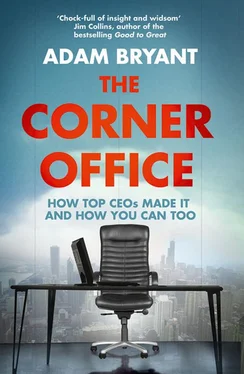Many CEOs seem driven by a strong work ethic forged in adversity. Perhaps they started working at a young age and always had jobs as they grew up. Others worked because they had little choice, because they grew up in homes where money was tight. As they moved up in organizations, the responsibilities grew in scale, but the attitude remained the same – this is my job, and I’m going to take care of it, and own it. Because of that attitude, they are rewarded with more responsibilities, challenges, and promotions.
“I grew up dirt poor,” said Carol Bartz, the CEO of Yahoo. “My mom died when I was eight, so my grandmother raised my brother and me. She had a great sense of humor, and she never really let things get to her. My favorite story is when we were on a farm in Wisconsin; I would have probably been thirteen. There was a snake up in the rafter of the machine shed. And we ran and said, ‘Grandma, there’s a snake.’ And she came out and she knocked it down with a shovel, chopped its head off, and said, ‘You could have done that.’ And, you know, that’s the tone she set. Just get it done. Just do it. Pick yourself up. Move on.”
Nancy McKinstry, the CEO of Wolters Kluwer, the Dutch publishing and information company, also grew up in modest circumstances and learned to deal with the challenges of juggling schoolwork and jobs.
“I grew up without a lot of money,” McKinstry said. “My mother was a schoolteacher and my parents were divorced when I was fairly young. So I watched my mother support a family on a schoolteacher’s salary, which wasn’t very much back in those days, and I watched her persevere. What I learned from her is the value of education and that hard work can make a difference. Because we didn’t have a lot of money, I worked all the time. So when I was in college I worked two or three different jobs to fund my way through. So that ability to keep a lot of balls in the air and keep adapting to situations to try and make things happen every day was something that stuck with me.”
When she’s hiring, she looks for this quality in others. They don’t necessarily need to have grown up in a house hold where money was tight. She’s just looking for evidence that they handled difficult challenges.
“I like hiring people who have overcome adversity, because I believe I’ve seen in my own career that perseverance is really important,” McKinstry said. “And if you can overcome some obstacle and keep moving up the field, it’s tremendous. In any business you’re going to be confronted with challenges, and so how you overcome them becomes important to your ability to drive the results forward. So when I interview folks, I will ask them directly: ‘Give me an example of some adverse situation you faced, and what did you do about it, and what did you learn from it?’ The people I’ve hired who have had that ability to describe the situation have always worked out, because they’re able to sort of fall down, dust themselves off, and keep fighting the next day.”
The CEOs’ stories help bring to life a concept in psychology known as “locus of control.” In general, it refers to a person’s outlook and belief about what leads to success and failure in their life. Do they tend to blame failures on factors they cannot control, or do they believe they have the ability to shape events and circumstances by making the most of what they can control? In other words, do they make the most of what ever hand they are dealt? It’s not just a sunny attitude. It’s a positive attitude mixed with a sense of purpose and determination.
Ursula Burns of Xerox grew up poor on the Lower East Side of Manhattan, watching her mother struggle to raise her and her brother and sister, controlling what she could about their circumstances. Burns embodies this quality herself – making the most of those things she can control – and she wants her employees to embody them, too.
Burns’s mother made ends meet by looking after other children. She also ironed shirts for a doctor who lived down the street and cleaned his office, bartering for things like medicine and even cleaning supplies. Burns’s mother had many sayings – and she repeated them, often in blunt terms, over and over. “Where you are is not who you are,” she would tell her children. “Don’t act like you’re from the gutter because you live in a place that’s really close to the gutter.”
She set firm expectations, Burns recalled. “She was very, very black-and-white and very clear about what responsibilities we had. One was that we had to be good people. And the second thing was that we had to be successful. And so her words for success were, ‘You have to give’—and she would say this all the time—‘more than you take away from the world.’ ”
Her mother, who died before she could see her daughter rise to the top at Xerox, also insisted that her children get a college education. “You have to worry about the things you can control,” she would say. “Don’t become a victim.”
It was a theme that Burns herself touched on in a big meeting with Xerox employees not long after she took over as CEO. The lousy economy, the past boardroom dramas at Xerox – it was time to move on. She repeated one of her mother’s sayings to a gathering of hundreds of sales reps: “Stuff happens to you, and then there’s stuff that you happen to.” Grammarians might take issue with the phrasing, but the message is clear. Don’t let circumstances or potential excuses get the better of you. Stare them down, and make things happen.
Andrew Cosslett of InterContinental Hotels Group offered another example of how this quality is shared by people at the top. Cosslett had a rough childhood, and grew up living largely on his own from the time he was about sixteen. His schoolwork suffered as he focused more on rugby and other sports, and being “the boy about town,” he said. He managed to scrape by in school through his teenage years, and grew more focused in his twenties.
Not long after he was named CEO, Cosslett was sitting with his top executives at an off-site meeting, and they went around the room, sharing stories about their backgrounds.
“It was a facilitated conversation as part of our time together, to try to understand what drove us, and our kind of purpose and meaning, what led us to be the people we are,” Cosslett said. “What was extraordinary was that of the ten people in the room, nine of them had had very challenging teenage years, either with broken homes, family divorces, alcoholic parents, mothers getting beaten up, brothers or sisters dying. So 90 percent of the people in that room had something like that in their background. And I don’t think that would be typical if you looked at the normal flow of society as a cross section. So there’s something about what happened to them as kids that sort of pushed them on. And I think it’s this thing about learning about your own strength that makes you mature more quickly and allows you to progress faster.”
He elaborated on this quality, and discussed how he tries to learn in interviews whether a job candidate has it.
“You learn a lot very quickly about managing in difficult situations,” he said. “One of the things that makes you see the world differently and forms you as an individual is if you’ve had to rely on your own wit and resources. If you’ve had a challenging upbringing, I think that’s part of it. I think rugby is another one because there’s no hiding place. It’s a physical confrontation, and there’s a moment of truth where you’re going to be tested in a game. Everybody sees you, even though it’s being done at high speed, and everybody knows whether you’re the type to back down or stand up. It’s never talked about, but everybody knows. And more than anything you know whether you’re that type or the other type.
Читать дальше












